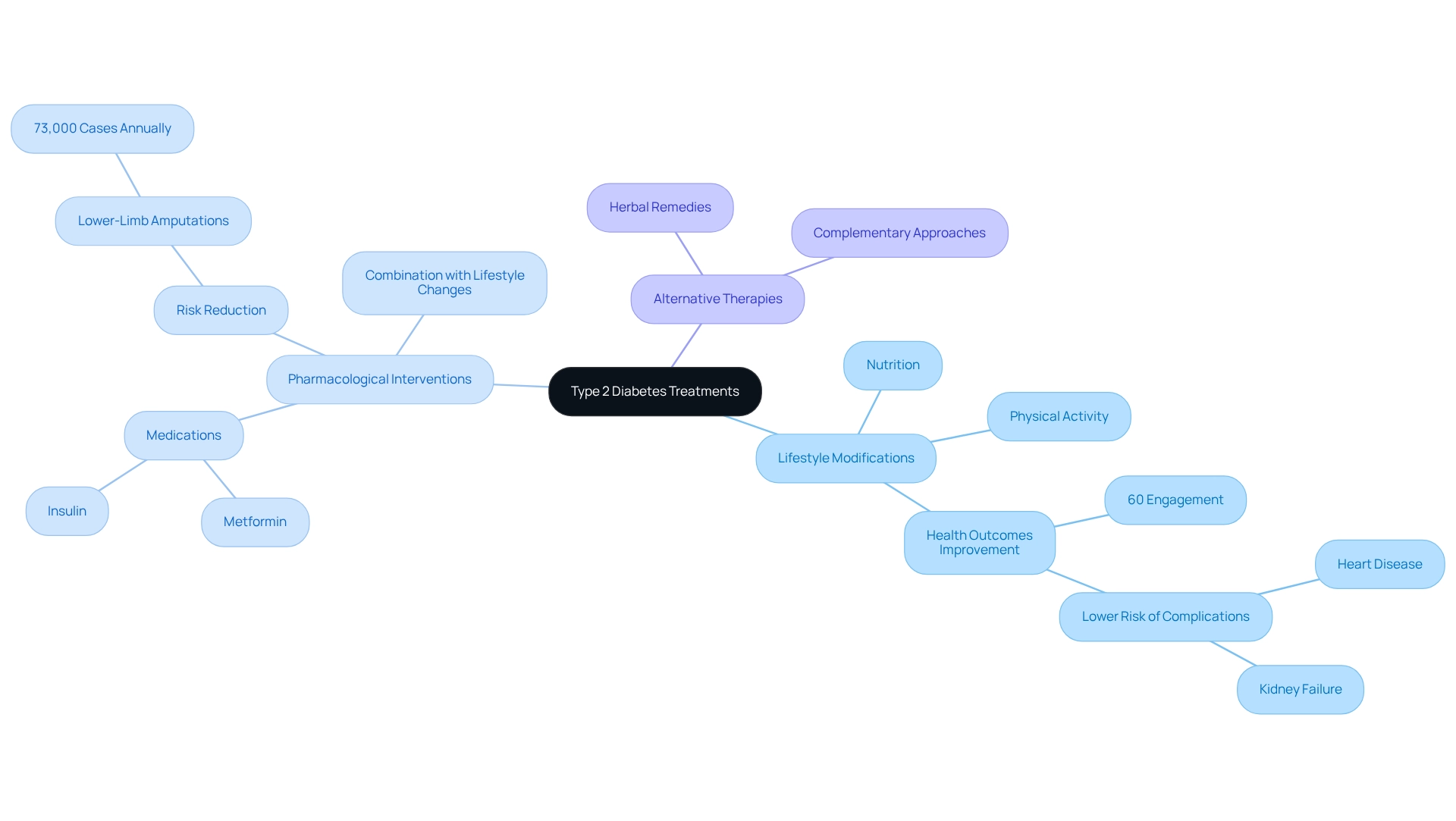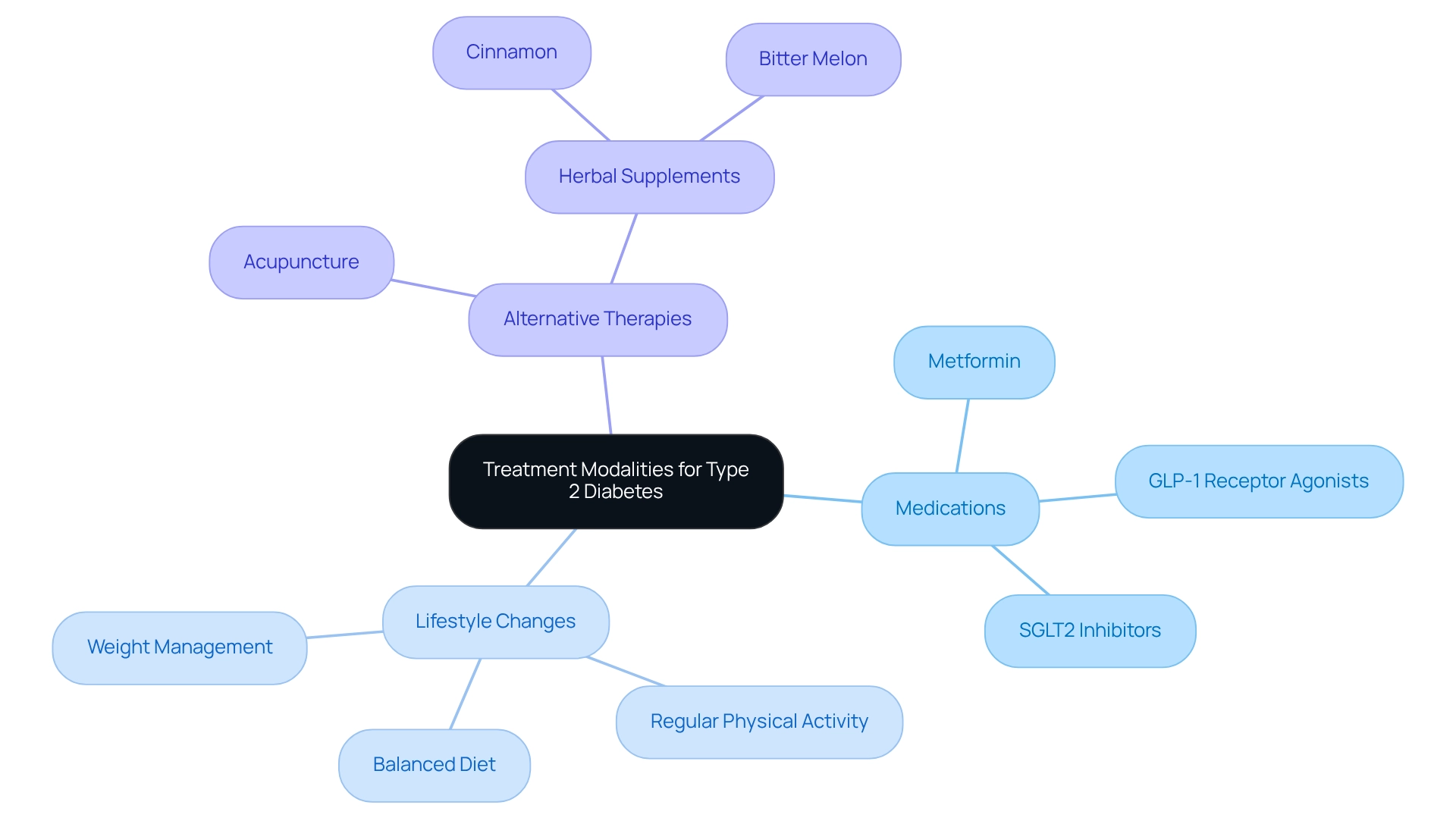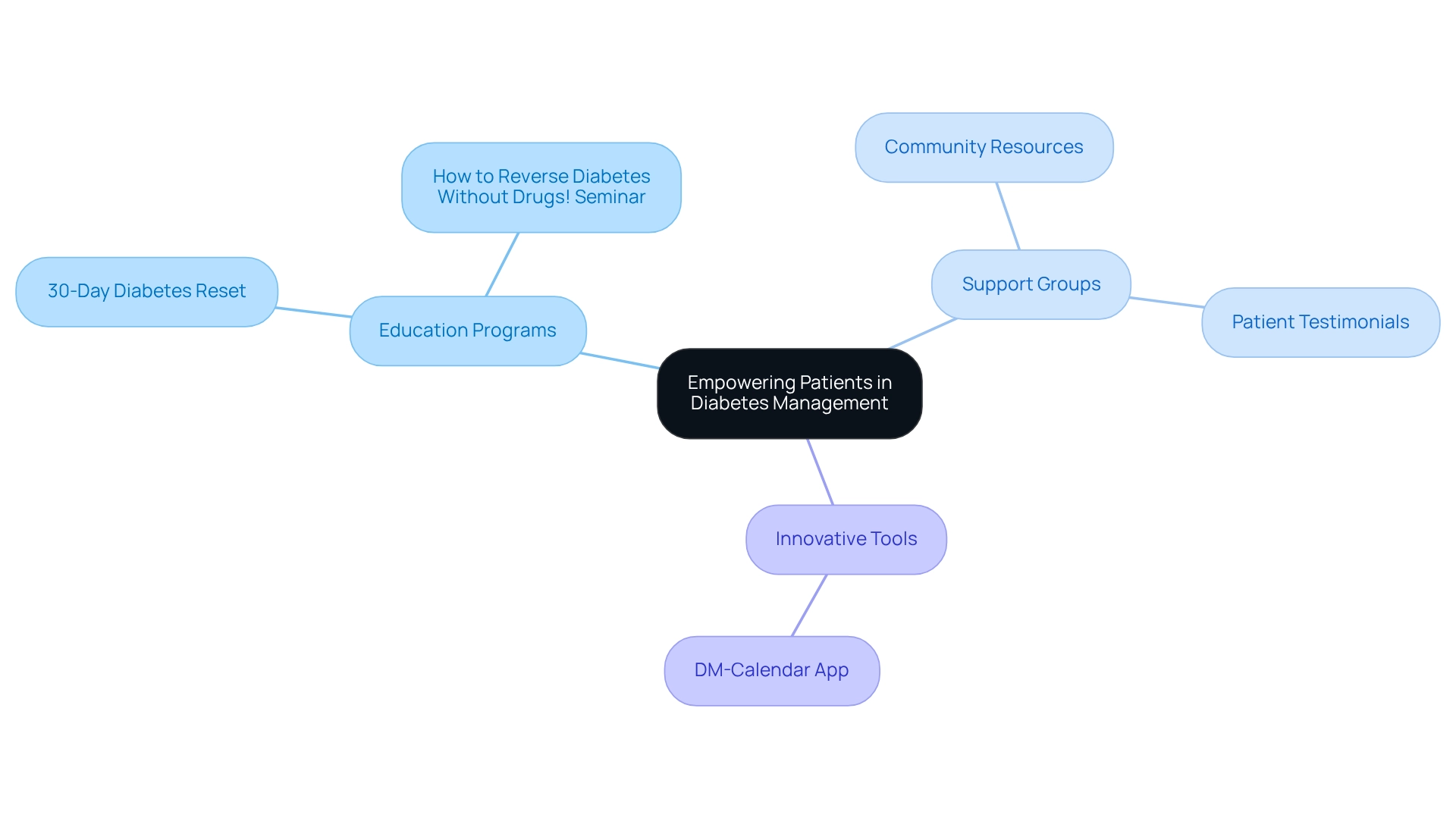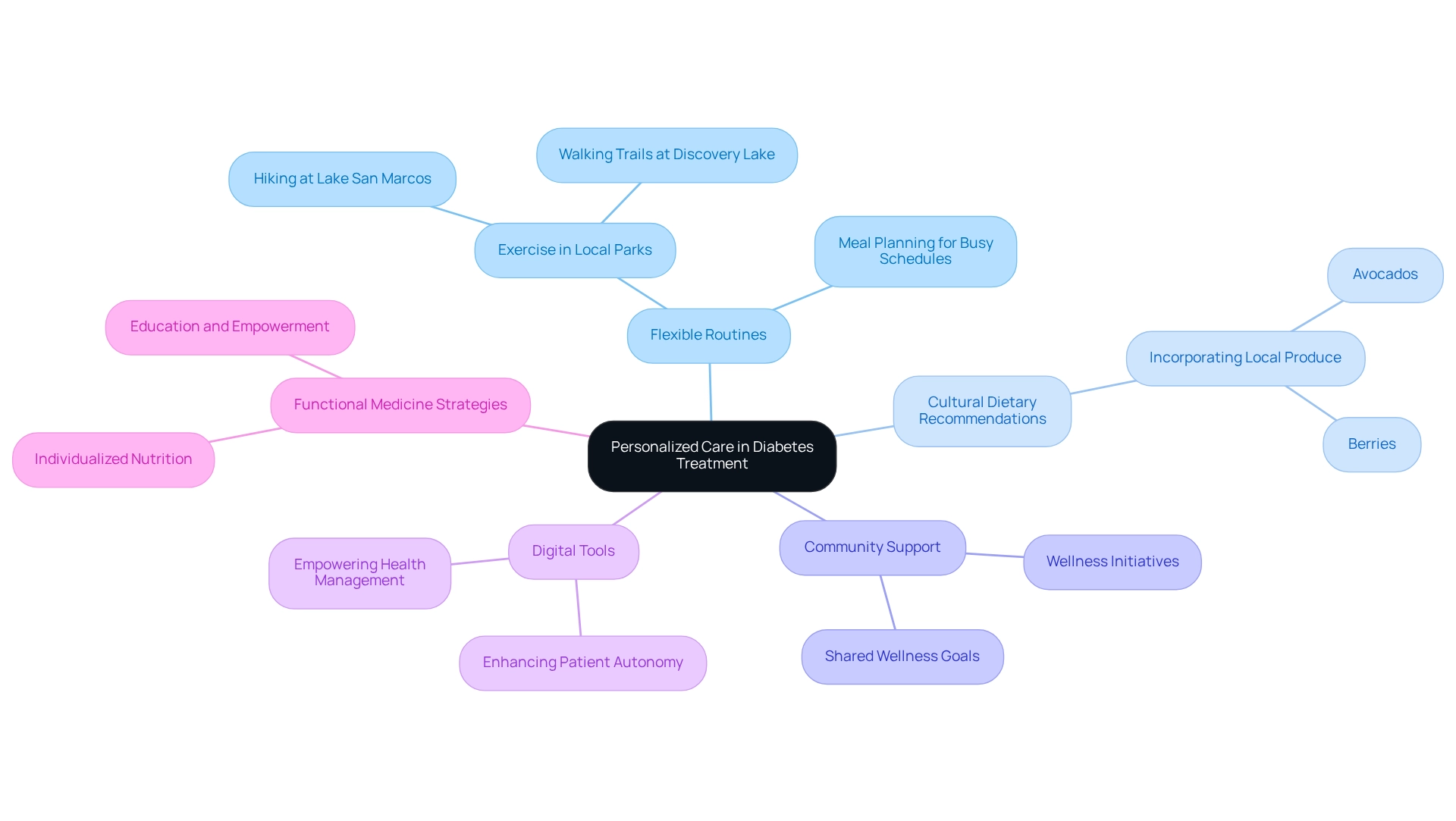Overview
Managing type 2 diabetes can feel overwhelming at times, but it’s important to recognize that there are effective treatments available. These include:
- Lifestyle modifications
- Pharmacological interventions
- Alternative therapies
Together, these strategies help regulate blood sugar levels and address the underlying causes of the condition.
Many patients find that a comprehensive approach, which combines these various methods, not only improves health outcomes but also empowers them to take control of their diabetes management. This journey toward better health is not just about treatments; it’s about nurturing a lifestyle that supports your well-being.
Imagine feeling more in control of your health, with the knowledge and tools to manage your diabetes effectively. By embracing these strategies, you are taking a significant step toward a healthier future. Remember, you are not alone in this journey, and support is available every step of the way.
Introduction
In the complex journey of managing type 2 diabetes, it’s essential to recognize the challenges you may face. A multifaceted approach can make a significant difference in your treatment experience. With a deeper understanding of this condition, healthcare providers are increasingly focusing on personalized care. This means integrating lifestyle changes, medications, and even alternative therapies to empower you on your path to better health.
As you navigate your health journey, education and support are vital. They equip you with the necessary tools to take control of your diabetes. Many patients find that having access to tailored strategies that address their unique needs leads to improved health outcomes and a better quality of life. This article explores the various treatment options available to you, emphasizing the importance of a personalized approach that resonates with your individual preferences and circumstances.
Defining Type 2 Diabetes Treatments
Managing type 2 diabetes can feel overwhelming, but understanding what are the treatments of type 2 diabetes can help you take control of your health. These treatments, which address what are the treatments of type 2 diabetes, encompass a variety of approaches aimed at regulating blood sugar levels and addressing the underlying causes of the condition. They can be grouped into three main areas:
- Lifestyle modifications
- Pharmacological interventions
- Alternative therapies
Lifestyle changes, particularly in nutrition and physical activity, are essential for effectively managing diabetes. Many individuals—around 60%—actively engage in these changes to improve their health outcomes. Not only do these modifications help regulate blood sugar levels, but they also lower the risk of complications associated with diabetes, such as heart disease and kidney failure. It’s important to recognize that small, consistent changes can lead to significant improvements.
Pharmacological interventions, including medications like metformin and insulin, are essential to understand what are the treatments of type 2 diabetes for many people. These therapies are effective in managing blood glucose levels. Studies have shown that timely pharmacological intervention can significantly reduce the risk of serious complications, including lower-limb amputations, which affect approximately 73,000 diabetics each year. Many patients find that combining medication with lifestyle changes leads to the best results.
In 2025, new therapies have emerged that complement traditional methods, further enhancing patient outcomes. Experts emphasize the importance of a holistic treatment plan that combines lifestyle adjustments with medication, especially when addressing what are the treatments of type 2 diabetes. As one endocrinologist noted, “Effective diabetes management necessitates a balance of lifestyle changes and pharmacological assistance to attain optimal well-being.”
Incorporating these strategies empowers you to take charge of your health and fosters a supportive environment for long-term success. By understanding and implementing what are the treatments of type 2 diabetes, you can significantly enhance your quality of life and reduce your reliance on conventional medical interventions. Remember, you are not alone on this journey, and every step you take towards healthier living is a step towards a brighter future.
Exploring Treatment Modalities: Medications, Lifestyle Changes, and Alternative Therapies
Managing type 2 diabetes can feel overwhelming at times, but it’s important to recognize what are the treatments of type 2 diabetes and that a multifaceted approach can make a significant difference. What are the treatments of type 2 diabetes, which include:
- Medications
- Lifestyle modifications
- Alternative therapies
Medications like metformin, GLP-1 receptor agonists, and SGLT2 inhibitors are examples of what are the treatments of type 2 diabetes, and they play a vital role in regulating blood sugar levels. For instance, many find metformin effective in improving glycemic control, while GLP-1 receptor agonists have shown promising results in weight management and cardiovascular health.
But let’s not overlook the critical role of lifestyle changes. These adjustments can greatly enhance insulin sensitivity and overall well-being. Imagine incorporating a balanced diet rich in whole foods, engaging in regular physical activity, and focusing on weight management. These foundational elements can lead to substantial improvements in health outcomes. Recent studies indicate that individuals who embrace these lifestyle modifications often experience better glycemic management and may even reduce their reliance on medications.
Additionally, alternative therapies like acupuncture and herbal supplements might provide extra benefits. For example, have you heard about the potential of cinnamon and bitter melon? Studies suggest these natural remedies could help lower blood sugar levels, complementing conventional treatments beautifully.
A comprehensive method that combines these different modalities not only addresses the symptoms of type 2 diabetes but also helps you understand what are the treatments of type 2 diabetes to take charge of your well-being. This holistic strategy is essential for achieving lasting results and enhancing your quality of life. Remember, you are not alone on this journey, and with the right support and resources, you can thrive.
Empowering Patients: The Role of Education and Support in Diabetes Management
Empowering patients through education and support is essential for effectively managing their condition. Have you ever felt overwhelmed by the complexities of diabetes? Programs like Dr. Jason Shumard’s 30-Day Diabetes Reset offer individuals vital information and resources to help them make informed wellness decisions. Educational resources, such as the upcoming FREE “How to Reverse Diabetes Without Drugs!” seminar, deepen understanding of the condition and available treatment options. Many patients find that these insights can be transformative, as testimonials highlight their inspiring wellness journeys.
Support groups and community resources foster a sense of belonging and encouragement among those facing similar challenges. It’s important to recognize that research shows involvement in self-management education significantly correlates with improved health outcomes, including better blood sugar regulation and fewer complications. A systematic review involving 516 participants confirmed that engagement in Diabetes Self-Management Education (DSME) is among what are the treatments of type 2 diabetes, as it leads to a statistically significant decrease in A1C levels and reinforces its importance in managing the condition.
Additionally, innovative tools like the DM-Calendar App have proven effective in enhancing self-efficacy and clinical markers, showcasing the potential of technology in diabetes education. By emphasizing individual education and assistance, individuals can reclaim their well-being and improve their quality of life. So, why wait? Contact our office at 858-564-7081 today to find out if you qualify for a FREE consultation and discover how our personalized programs can support you in achieving revitalized well-being.
The Importance of Personalized Care in Diabetes Treatment
Customized care in managing blood sugar levels acknowledges the unique needs, choices, and health situations of each individual. By tailoring treatment plans to personal circumstances, healthcare providers can significantly improve the effectiveness of diabetes management. For instance, someone with a busy schedule might thrive with a flexible exercise routine and meal planning that accommodates their lifestyle. In San Marcos, CA, embracing an outdoor lifestyle by utilizing local parks and trails for regular exercise can be particularly beneficial. Engaging in activities like hiking at Lake San Marcos or walking the trails at Discovery Lake not only uplifts the spirit but also effectively supports blood sugar management.
It’s important to recognize that understanding a patient’s cultural background can lead to dietary recommendations that are both effective and culturally relevant. Including local produce, such as avocados and berries, in a balanced diet can enhance overall well-being and assist in blood sugar regulation. Moreover, participating in community wellness initiatives can provide vital support and resources tailored for managing blood sugar levels, fostering a sense of connection and motivation among individuals with shared wellness goals.
Many patients find that customized functional medicine strategies, as highlighted by Dr. Jason Shumard, focusing on individualized nutrition and education, empower them in their health management journey. This personalized approach encourages better adherence to care plans, ultimately leading to improved health outcomes for those interested in what are the treatments of type 2 diabetes. Recent research indicates that tailored care strategies can enhance condition management, with individuals expressing greater satisfaction and involvement in understanding what are the treatments of type 2 diabetes. Furthermore, the American Diabetes Association emphasizes that digital tools can empower individuals, enhancing their autonomy in managing their condition. By prioritizing personalized care, healthcare providers can cultivate a supportive environment that encourages patients to take charge of their health, paving the way for more successful diabetes management.
Conclusion
Managing type 2 diabetes is indeed a multifaceted journey, and it’s important to recognize the challenges you may face along the way. A comprehensive approach that integrates:
- Lifestyle modifications
- Pharmacological interventions
- Alternative therapies
can effectively help you control blood sugar levels and improve your overall health. Many patients find that making lifestyle changes, such as adopting a healthier diet and engaging in regular exercise, leads to significant health benefits. Medications like metformin, along with innovative therapies introduced in recent years, complement these efforts, emphasizing a balanced strategy for optimal health outcomes.
Education and support are essential in empowering you to take charge of your diabetes management. Programs that provide essential knowledge and tools can foster a sense of community and encourage you to pursue your health goals. Participation in diabetes self-management education has shown a direct correlation with improved health metrics, highlighting how informed decision-making can transform your experience with this condition.
Personalized care is the cornerstone of effective diabetes treatment. By understanding your unique circumstances, preferences, and cultural background, healthcare providers can create customized treatment plans that enhance your engagement and satisfaction. This holistic approach not only improves health outcomes but also fosters a supportive environment for you as you navigate the complexities of type 2 diabetes.
In conclusion, managing type 2 diabetes requires a collaborative effort between you and your healthcare providers. By embracing personalized care, leveraging educational resources, and integrating various treatment modalities, you can significantly enhance your quality of life and take control of your health. Prioritizing these strategies will empower you to navigate your diabetes journey with confidence and resilience. Remember, you are not alone in this journey, and support is always available.
Frequently Asked Questions
What are the main treatments for type 2 diabetes?
The treatments for type 2 diabetes can be grouped into three main areas: lifestyle modifications, pharmacological interventions, and alternative therapies.
How do lifestyle modifications help manage type 2 diabetes?
Lifestyle modifications, particularly in nutrition and physical activity, are essential for managing diabetes. They help regulate blood sugar levels and lower the risk of complications such as heart disease and kidney failure. Around 60% of individuals actively engage in these changes to improve their health outcomes.
What pharmacological interventions are commonly used for type 2 diabetes?
Common pharmacological interventions include medications like metformin and insulin, which are effective in managing blood glucose levels. Timely pharmacological intervention can significantly reduce the risk of serious complications, including lower-limb amputations.
How can combining medication with lifestyle changes improve diabetes management?
Many patients find that combining medication with lifestyle changes leads to the best results in managing type 2 diabetes. A holistic treatment plan that includes both approaches is emphasized by experts for optimal well-being.
What new therapies are emerging for type 2 diabetes treatment?
As of 2025, new therapies have emerged that complement traditional methods, further enhancing patient outcomes in managing type 2 diabetes.
Why is it important to understand the treatments for type 2 diabetes?
Understanding the treatments for type 2 diabetes empowers individuals to take charge of their health, enhances their quality of life, and reduces reliance on conventional medical interventions.



